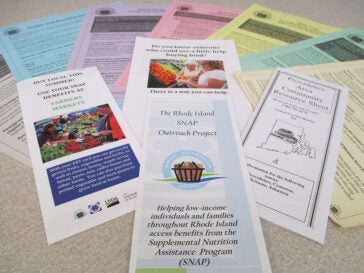New!! SNAP Eligibility Guidelines take effect October 1, 2023
SNAP Outreach
Helping low-income individuals and families throughout Rhode Island access benefits from the Supplemental Nutrition Assistance Program, SNAP.
URI SNAP Outreach
In situations of hunger and poverty, families are faced with limited choices. The single most important federal nutrition program aimed at improving the nutritional intakes of low-income families is the Supplemental Nutrition Assistance Program, SNAP. The US Department of Agriculture encourages states to conduct outreach activities to improve access to and increase participation in SNAP by ensuring eligible households apply for and receive nutrition assistance.
Between 2001 and 2020, the URI Feinstein Center for a Hunger Free America was awarded an annual contract from the RI Department of Human Services to conduct Rhode Island’s SNAP Outreach efforts. While no longer holding the DHS contract, the URI SNAP Outreach Project continues to work to improve access through education efforts targeted to the public at large, to professional staff and volunteers who work with low-income individuals and to low-income individuals directly. With particular emphasis on populations at nutritional risk (i.e., the elderly, low-income working, homeless and immigrant households), the SNAP Outreach Project creates and distributes materials, provides trainings and offers client assistance through direct outreach in the community and a toll-free hotline. The SNAP Outreach Project in Rhode Island differs from those in other states in that much of the work is done by undergraduate students. In keeping with the Hunger Center’s mission to provide meaningful educational experiences for students at URI, undergraduate students work as outreach workers and office workers to conduct and support SNAP outreach.
Undergraduates are an integral part of these outreach efforts. Each semester, students from a wide variety of academic disciplines, work for and intern at the Hunger Center. Whether working in our office or in the community, URI students hone their skills ranging from writing and organizational skills to communication and empathy through their exposure to working with a diverse clientele, including seniors, people with mental and physical disabilities, ethnic and racial minorities, and immigrant populations.
What is SNAP?
SNAP is a federal program that provides nutritional assistance to low-income households. Benefits supplement the food budgets of families and individuals so they may purchase more and higher quality foods using the EBT (Electronics Benefits Transfer) card.
The EBT card can be used to pay for food at supermarkets and convenience stores, as well as some farmer’s markets and food co-ops. Each month, benefits are directly deposited into the household’s EBT account.
SNAP benefits also provide a subsidy to farmers and increase activity in local grocery stores. In 2019, over 240 million federal dollars entered the RI economy as people used their SNAP benefits.
Why SNAP Outreach?
While many Rhode Islanders participate in the Supplemental Nutrition Assistance Program, thousands of our neighbors are unaware of their eligibility or need help in order to access benefits. The SNAP outreach project seeks to educate both those who are potentially eligible and the greater community about SNAP and its benefits through creation and distribution of educational materials, trainings, and direct client assistance.
Outreach Examples
Below are some examples of the outreach activities of the SNAP Outreach Project. A more complete explanation of outreach efforts and initiatives may be found at www.eatbettertoday.com.
Client Assistance

Undergraduate students are hired as SNAP Outreach Workers to provide client assistance throughout the RI community. Outreach workers undergo extensive training and participate in weekly professional development meetings in order to ensure they are able to successfully assist clients. When working in the community, outreach workers answer questions about SNAP and help interested individual complete applications. The Outreach Workers also staff a toll-free hotline providing information about SNAP to callers from across the state. In their role as Outreach Workers, students:
- Provide basic information about the Supplemental Nutrition Assistance Program and its benefits
- Pre-screen potential applicants
- Assist with SNAP applications or certification forms
- Prepare applicants for the interview process
- Answer questions about the Supplemental Nutrition Assistance Program
Outreach Materials
 URI students and staff create a wide range of educational materials. Some flyers address broad based SNAP questions while others offer guidance or information geared to specific populations such as seniors, immigrants, working families or students. Materials commonly provide:
URI students and staff create a wide range of educational materials. Some flyers address broad based SNAP questions while others offer guidance or information geared to specific populations such as seniors, immigrants, working families or students. Materials commonly provide:
- Answers to frequently asked questions
- Information about the application process
- Community updates regarding new SNAP policy changes
- Information about the benefits of program participation
All materials are available in English and Spanish and other languages are available upon request. Materials are often created as the result of a request by a community partner to address their particular agency’s need.
Outreach Trainings
The SNAP Outreach Project offers three types of trainings depending on agency needs and the populations they serve.
- Community Information Presentations provide basic information to community groups and agencies about hunger in RI and SNAP.
- Outreach Trainings are targeted to staff and volunteers of social service agencies working with low-income individuals. The trainings cover the benefits of SNAP, eligibility and application guidelines.
- Group Eligibility Presentations allow potentially eligible individuals to learn about SNAP with their peers. At these meetings Outreach staff review frequently asked questions and share information about the benefits of participating in SNAP. Application assistance may also be included in these sessions.
More Information
For one-on-one assistance call our toll free hotline:
1-866-306-0270
